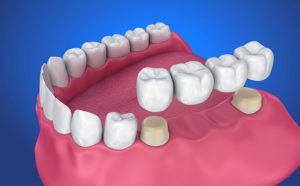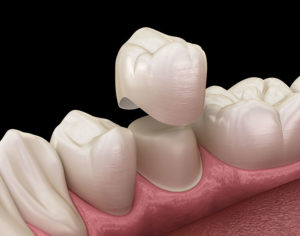
The use of dental bridges and crowns is among the many techniques used in Restorative Dentistry. Restorative Dentistry is a branch of dentistry concerned with the replacement and restoration of missing or damaged teeth. The goal is not only to improve the patient’s smile but also to prevent several oral and dental problems from occurring in the absence of treatment. Dental restoration protects the rest of the teeth in your jaw by keeping them from migrating into the space of missing teeth and becoming loosened or misshapen. A good smile also has a tremendous psychological impact, improving your self-esteem and confidence.
A dental bridge is a fixed dental restoration (a fixed dental prosthesis) used to replace one or more missing teeth by joining an artificial tooth definitively to adjacent teeth or dental implants. Dental bridges are of different types and are classified according to durability, material, and design.

The durability of a dental bridge can either be temporary (also known as “provisional” or “interim’”) or permanent.
The material of a dental bridge can be made out of 1) a metallic base that includes metal alloys or noble metal; or 2) porcelain fused to metal (PFM), or ceramics.
The design of a dental bridge refers to the different types available, including a conventional dental bridge, a Maryland dental bridge (adhesive bridges), a cantilever bridge, or an implant-supported bridge.

A dental crown is a tooth-shaped “cap” placed over a tooth that has been damaged. The crown covers the damaged tooth to restore its shape and size, strength, and improve its appearance. When cemented into place, a crown encases the majority of the visible portion of a tooth that lies at and above the gum line.
A dental bridges provide many benefits to patients, including:
A dental crowns offer many benefits to patients, including:
For children, a crown may be used on primary (baby) teeth to save a tooth that has been so damaged by decay that it can’t support a filling; to protect the teeth of a child at high risk for tooth decay, especially when a child has difficulty keeping up with daily oral hygiene; and to decrease the frequency of general anesthesia for children unable to cooperate with requirements of proper dental care because of age, behavior, or medical history.
During your consultation, Dr. Reece will go over your medical and dental history and examine your mouth and the area being considered for bridgework. Necessary x-rays may also be taken as well as a cast of your teeth.
Following this exam, Dr. Reece will assess whether or not the teeth that would hold the bridge would need some work before the bridge is made. For example, some patients may need a root canal on one of the teeth before the bridge is started.
Once any foundation work has been completed, Dr. Reece will schedule you for an appointment for bridgework.
Getting a dental bridge is typically a two-appointment process.
Your first appointment is for preparing the abutment teeth for the crowns that will hold the bridge in place. Dr. Reece will
After your first appointment, Dr. Reece will schedule your second appointment for cementing the permanent bridge into place.
During that appointment, Dr. Reece will
Note that depending on the type of bridge the patient is getting, multiple visits may be required to check the fit of the metal framework and bite before permanently cementing the bridge into place.
During your consultation for a dental crown, Dr. Reece will go over your medical and dental history with you and then examine your mouth and the area being considered for a crown.
Dr. Reece may take a few necessary x-rays to check the root of the tooth and surrounding bone. If the tooth has extensive decay or if there is a risk of infection or injury to the tooth’s pulp, she may recommend that you have a root canal done first.
Getting a dental crown is a two-appointment process.
Your first appointment is for preparing your tooth for a crown. Dr. Reece will
The impressions for your dental crown are then sent to a dental lab to create your permanent crown.
After your first appointment, Dr. Reece will schedule your second appointment for cementing the permanent crown into place atop the prepared tooth.
During that appointment, Dr. Reece will
While dental bridges and crowns can last a lifetime, they do sometimes come loose or fall out. The most important step you can take to ensure your bridge or crown’s longevity is to practice good oral hygiene.
Dental bridges and crowns, on average, can last about 15 years if you take proper care of them.
If you are interested in dental crowns or bridges, call Advanced Dentistry of Kearney at (308) 237-1311 to schedule an appointment with Dr. Reece.